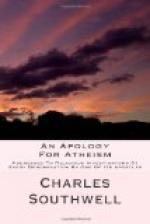Des Cartes, in his second ‘Meditation,’ says—Imaginari nihil aliud est quam rei corporeos figuram seu imaginem contemplari—which sentence indicates that he agreed with D’Alembert as to the exclusive limitation of imagination to things material and sensible.
The same opinion seems to have been held by Locke, who in the concluding chapter of his ‘Essay on the Human Understanding,’ states as something certain, and therefore beyond dispute, that ’the understanding can only compass, first—the nature of things as they are in themselves, their relations and manner of operation—or secondly, that which man ought to do, as a rational and voluntary agent, for the attainment of any end, especially happiness—or thirdly, the ways and means by which the knowledge of both the one and the other of these is attained and communicated.’
Adam Smith too, in book 5, c. 1, of his ‘Wealth of Nations,’ assures us the ancient Greek philosophy was divided, into three branches—Physics, Ethics, and Logic; and after praising such general division of philosophy, as being perfectly agreeable to the nature of things, says that, ’as the human, mind and the Deity, in whatever their essence may be supposed to consist, are parts of the great system, of the universe, and parts too, productive of the most important effects, whatever was taught in the ancient schools of Greece concerning their nature, made a part of the system of Physics.’
Dr. Campbell, in his ‘Philosophy of Rhetoric,’ ventures to assign ’local habitation,’ as well as ‘name’ to spirit itself. Nay, he makes something of Deity, and the Soul; for spirit, says he, which here comprises only the Supreme Being and the human Soul, is surely as much included under the idea of natural object as body is, and is knowable to the philosopher purely in the same way—by observation and experience.
It would be difficult to exaggerate the importance of these opinions—they are eminently worthy of attention. If God is a spirit—and spirit ’is surely as much a natural object as body is’—the idea of something supernatural cannot for one instant be entertained. If God is really no more than a ‘part’ of the great system of the universe, to immaterialise Him is absurd, inconsistent, and idolatrous. Let it be granted that God is ’part of nature, and a part too, productive of most important effects;’ and what Logician will be fool-hardy enough to declare Him without body, parts, or passions?
Nor are Locke’s dicta as to the compass of the understanding easier to be explained away than these of Dr. Campbell and Adam Smith. If we cannot know more than ‘the nature of things as they are in themselves,’ their relations, manner of operation, &c. only ignorant or cunning men will pretend acquaintance with the supernatural. That nothing natural can possibly conceive what is above nature is indeed so palpably true as to deserve a place among philosophical axioms. Imagination




